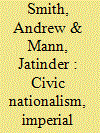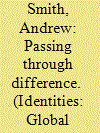|
|
|
Sort Order |
|
|
|
Items / Page
|
|
|
|
|
|
|
| Srl | Item |
| 1 |
ID:
145456


|
|
|
|
|
| Summary/Abstract |
This article explores the three themes of civic nationalism, imperial identities and Punjabi migration by focusing on the life of Sundar Singh, a migrant to Canada who came to prominence in the early 1900s, through his speeches. Sundar Singh employed the idea of equal status of all British subjects in the British Empire to argue for the migration of Sikhs to Canada and other British settler societies and their being treated with respect and fairness on their arrival in their new homes. Although Singh's claim to Britishness was rejected in many sections of Canadian society, it was supported by some white Canadians. The article suggests that British identity of the Empire's Dominions could, in some circumstances, be a force for the inclusion of South Asians. The article also illustrates the way in which developments in India impacted upon those of the diaspora across the British Empire. This idea is developed by demonstrating the importance of the triangular relationship between India, the United Kingdom and Canada as highlighted by the issue of Punjabi migration within the British Empire.
|
|
|
|
|
|
|
|
|
|
|
|
|
|
|
|
| 2 |
ID:
190922


|
|
|
|
|
| Summary/Abstract |
We argue that the stories told about the histories and nature of places, are vehicles for narrating race. Drawing on interviews with professionals and community workers in Butetown in Cardiff and Govanhill in Glasgow, we explore how they negotiated – and contested – racialized histories of place, constructing different versions or claims to belong. Drawing on Henri Lefebvre’s spatial concepts we explore this conceptualization through examination of the two areas that have distinct histories, and present experiences, of migration and racialization. In discussion of the accounts from the two distinct areas, we show that narratives of the past have a political resonance that shape accounts of current experiences of migration. Accounts of place are often related in relationship to comparisons with and narratives of other places and to global processes of trade and migration. Whilst these racialized narratives are contested, they also shape responses to social problems faced by communities.
|
|
|
|
|
|
|
|
|
|
|
|
|
|
|
|
| 3 |
ID:
174038


|
|
|
|
|
| Summary/Abstract |
This essay offers a comparative analysis of the work of Henri Lefebvre and C.L.R. James, both key contributors to the emergence of a humanist form of Marxism in the twentieth century. Independently of each other, both writers, I show, developed a mode of critique which emphasised capitalism’s dehumanizing social effects, and which rejected a merely instrumental or utilitarian political response. Consequently, both writers placed critical emphasis on those longings and demands made evident in the insurgent politics of everyday life and popular culture; in what both conceptualised as a search for ‘happiness‘. But at the same time, the comparison is important because it makes evident the extent of the divisive intellectual legacies of empire within European Marxism. Lefebvre’s work bears in itself the marks of a racialised understanding of human relations; the ’human’ of which he speaks is limited in ways that James challenged consistently.
|
|
|
|
|
|
|
|
|
|
|
|
|
|
|
|
|
|
|
|
|